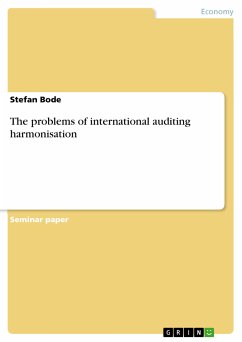Essay from the year 2003 in the subject Business economics - Accounting and Taxes, grade: 1,0 (A), University of Glamorgan, course: International Accounting and Auditing, language: English, abstract: Businesses have become increasingly aware of environmental implications on their operations, products, and services. Environmental risks may have serious consequences for the prospects of a company, with particular financial consequences such as clean up costs or fines if a company fails to meet regulations. Environmental sensitive industries such as oil companies, waste management, or chemical industries are especially jeopardised. Various pressure groups, such as the public, investors, customers, employees, media, or business partners are interested in the environmental activities of a company. Greater attention is paid to the way the company manages and improves its environmental performance. In some countries, such as Sweden, Denmark, and the Netherlands, there exists a complex and strong legislation regarding environmental behaviour. Companies are required to meet certain conditions to continue their operations and various standards have been developed in order to compensate for the lack of legislation in other countries. These standards are for example the British Standard for Environmental Management in the UK, ISO 14001 from the International Standards Organisation, or the European Union’s Eco- Management and Audit Scheme. These standards demand the establishment of an environmental management system, which is a framework of environmental objectives within which a company has to operate, and include the compliance of environmental regulations and statutes. Internal environmental audits have to be carried out to ensure the effectiveness of the environmental management system. These help to estimate the risk of environmental impacts, to prevent pollution, to allocate the source of pollution or to quantify liability accruals for known environmental issues. External environmental audits are required to validate reports being published and the information found during the internal audit. a far-reaching knowledge and sufficient competence. But some environmental issues are too complex and only professionals, such as engineers for example, can deal with them. The environmental audit becomes an essential and vital component of the environmental management profession. The demand for skilled auditors has been risen, but a professional body of environmental auditors to ensure the competence of an environmental auditor does not exist. Various approaches to tackle these circumstances have been made. ...
Bitte wählen Sie Ihr Anliegen aus.
Rechnungen
Retourenschein anfordern
Bestellstatus
Storno









